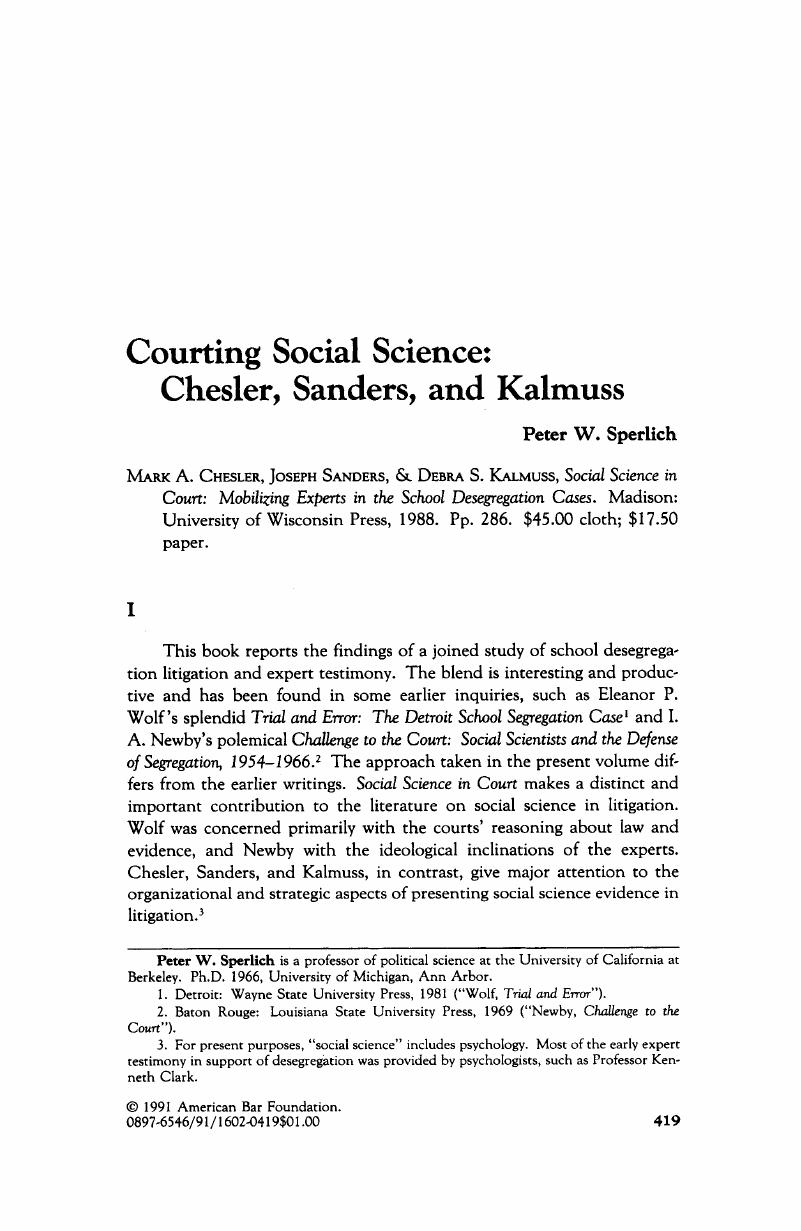No CrossRef data available.
Article contents
Courting Social Science: Chesler, Sanders, and Kalmuss
Published online by Cambridge University Press: 27 December 2018
Abstract

- Type
- Book Review
- Information
- Copyright
- Copyright © American Bar Foundation, 1991
References
1 Detroit: Wayne State University Press, 1981 (“Wolf, Trial and Error”).Google Scholar
2 Baton Rouge: Louisiana State University Press, 1969 (“Newby, Challenge to the Court”).Google Scholar
3 For present purposes, “social science” includes psychology. Most of the early expert testimony in support of desegregation was provided by psychologists, such as Professor Kenneth Clark.Google Scholar
4 Brown v. Board of Education, 347 U.S. 483 (1954).Google Scholar
5 The insistence on integration has reached remarkable levels in some areas of public life. The principle of the mandatory association of all peoples has produced laws that, for example, force landlords and innkeepers to rent to families with infants—denying to older people the right to be free of the noise and destruction that accompany small children. Regarding the issue at hand, the equality-of-outcome standard now has been applied in the public schools to such matters as disciplinary measures, grades, and promotions—which now must be roughly equal even for the most different groups.Google Scholar
6 338 F. Supp. 582 (E.D. Mich., 1971).Google Scholar
7 418 U.S. 717 (1974). For a detailed analysis of the Detroit litigation see Wolf, Trial and Error. Google Scholar
8 Wolf, Trial and Error 85, 101, 108, 135, 229.Google Scholar
9 163 U.S. 537 (1896).Google Scholar
10 175 U.S. 528 (1899).Google Scholar
11 347 U.S. 483.Google Scholar
12 Newby's Challenge to the Court (cited in note 2) attacked the defendants' experts as “scientific racists.” Other commentators have asserted that the defendants did not deserve expert assistance, and that to provide such assistance evinced (at minimum) a gross deficiency in scholarly judgment (Chester et al. at 130–31). Ideological judgments as to who does and who does not deserve the benefits of scholarship are not limited to the domain of school desegregation. For example, when Rosalind Rosenberg testified that some differentiated employment patterns may be due to different job preference among men and women, feminist historians called her testimony an “immoral act” and the Conference Group on Women's History passed a resolution stating: “We believe as feminist scholars we have a responsibility not to allow our scholarship to be used against the interests of women struggling for equity in our society” (at 162). Ideologies fiercely held and interests strongly pursued are incompatible with the requirements of science. When scholars are captured by interest groups, the factual truth of observations must give way to “political correctness.”Google Scholar
13 As Chesler et al. point out: “Many defense witnesses testified for the defense in spite of, rather than because of, their personal political position” (at 164). For them, clearly, personal preferences did not overwhelm scholarship. Their greater commitment to scholarly neutrality also can be glimpsed from the fact that 100% of the defense experts but only 60% of the plaintiff experts declared themselves willing to assist the other side (at 167).Google Scholar




